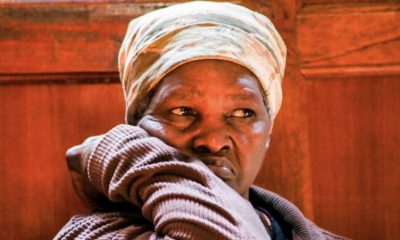Investigations
Going After The Dead Foreigners’ Land: Singer Ringtone and Politician Agnes Kagure’s Disturbing Parallels

In Nairobi’s upscale neighborhoods of Karen and Runda, a troubling pattern has emerged involving prime properties once owned by deceased foreigners. At the center of multiple high-profile disputes are two notable Kenyan personalities: gospel musician Alex Apoko, known as Ringtone, and Nairobi politician Agnes Kagure.
Both have become entangled in remarkably similar controversies—laying claim to valuable properties shortly after the deaths of their foreign owners, raising serious questions about Kenya’s property rights protections.
The systematic targeting of deceased foreigners’ estates
Court records reveal striking similarities in how both Ringtone and Kagure have attempted to acquire properties worth millions of dollars.
In both cases, they’ve claimed to have purchased the properties from elderly foreign owners shortly before their deaths, presenting documentation that experts have later questioned as potentially fraudulent.
“This appears to be a calculated pattern targeting vulnerable elderly expatriates with valuable land holdings and limited local family connections,” says property lawyer Martin Ochieng, who specializes in estate litigation.
“Once the original owner dies, suddenly these powerful individuals emerge with purported sales agreements that the deceased’s representatives know nothing about.”
Gospel artist Ringtone, who rose from street life to musical fame, now faces criminal charges for allegedly defrauding Teresiah Adhiambo Odhiambo of land worth Sh50 million in Runda.
Court documents show Ringtone claimed adverse possession, asserting he had lived on the property since 2001 a claim investigators found questionable after reviewing land registry records showing Ms. Odhiambo had legally purchased the property in 2000 and built a house there in 2009.
This isn’t Ringtone’s first such dispute.
In 2023, he was charged with malicious damage to property and assault after a confrontation with a South Sudanese family over a Karen property registered to their late father, Kongkong Paulino Matip.
Perhaps most notably, in 2021, Ringtone became involved in a legal battle over a Runda property belonging to deceased Swedish national Mona Ingegard Bjorklund, who died in 2007.
Despite a contested will being on record, Ringtone claimed Bjorklund had “rescued him from the streets” and allowed him to live on her property for over 20 years.
In another incident in 2016, Ringtone attempted to evict a family from a Runda home that had belonged to a deceased foreigner, claiming he had been paying rent and living there for two years—while the family maintained they had lived there for 35 years.
Kagure’s Sh600 million Karen land battle
Meanwhile, Agnes Kagure, who unsuccessfully contested the Nairobi gubernatorial seat in 2022, is fighting her own legal battle over prime Karen land worth Sh600 million, formerly owned by British businessman Roger Bryan Robson, who died in 2012.
Kagure claims she purchased the property from Robson for Sh100 million in cash a year before his death in 2011.
However, lawyer Guy Spencer Elms, who was named executor in Robson’s will dated March 24, 1997, has contested this claim.
Robson’s will intended to leave his properties to wildlife charities and a nephew in England.
The dispute intensified when Kagure filed court papers in October 2017 seeking to revoke Elms’ grant of probate, claiming the will was fraudulent.
She presented a sale agreement and transfer conveyance deed dated November 18, 2011.
In a dramatic twist, Elms reported to police that Kagure had fraudulently obtained transfer documents.
After forensic investigations, Elms himself was arrested and prosecuted in 2017 for allegedly forging the will—charges that were later dismissed in March 2019.
Additional witness testimony has further complicated Kagure’s claims.
Robson’s brother, Michael Fairfax, testified from the UK that Robson never sold the land to Kagure and was still living on the property when he died in August 2012.
Another witness stated that Robson’s signature on Kagure’s sale agreement did not match authentic examples and noted that the photo on the conveyance documents wasn’t even of Robson.
A British Lawyer’s Nightmare
The case involving Kagure has had particularly serious consequences for British lawyer Guy Elms.
According to UK media reports, Elms has been “shot at, held at gunpoint and threatened with prison” since attempting to execute Robson’s will.
Despite obtaining a court order in July 2015 instructing Kagure to vacate Robson’s house, the property reportedly remained occupied as police failed to enforce the order.
A forensic analysis by Kenya’s National Land Commission in March 2015 found that Robson’s estate had been targeted by “fraudsters working for influential people in the government” and “criminal goons enjoying political and police protection.”
The commission’s deputy director of investigations described the 2011 conveyance presented by Kagure as an “outright forgery.”
Troubling Connections
Investigations have revealed potential political connections that may explain the prolonged disputes.
Phone records obtained during Elms’ trial reportedly showed that Kagure exchanged over 49 text messages and calls with then-Governor of Nairobi Mike Sonko during the court proceedings in 2017.
Her nomination for deputy governorship was later shelved when these land dispute cases gained wider attention.
Legal experts point out that both Ringtone and Kagure appear to target similar victims—elderly foreigners with limited family connections in Kenya but substantial property holdings in upscale neighborhoods.
“I suspect the reason they targeted Roger’s land was that he was white, a recluse, and did not have any obvious relatives in the area,” Elms told British media. “I think this is not the first time it’s happened. I think some elderly whites are regarded as vulnerable and they are targeted to see what they can get away with.”
These cases highlight significant concerns about property rights protection in Kenya, particularly for foreign nationals and their estates.
They also raise questions about potential corruption within land registration systems and law enforcement agencies.
“When foreigners die in Kenya, their properties become extremely vulnerable,” says Catherine Mumbi, a property rights advocate. “The combination of slow-moving courts, potential corruption, and determined land cartels creates a perfect storm that can overwhelm even the most carefully drafted wills.”
Both the Ringtone and Kagure cases remain ongoing in Kenyan courts, with hearings often delayed and proceedings moving at a glacial pace. For now, the disputed properties remain in limbo, as do the charitable intentions of their deceased owners.
Kenya Insights allows guest blogging, if you want to be published on Kenya’s most authoritative and accurate blog, have an expose, news TIPS, story angles, human interest stories, drop us an email on [email protected] or via Telegram
-

 Investigations1 week ago
Investigations1 week agoBillions Stolen, Millions Laundered: How Minnesota’s COVID Fraud Exposed Cracks in Somali Remittance Networks
-

 News2 weeks ago
News2 weeks agoUS Moves to Seize Luxury Kenya Properties in Sh39 Billion Covid Fraud Scandal
-

 Investigations1 week ago
Investigations1 week agoJulius Mwale Throws Contractor Under the Bus in Court Amid Mounting Pressure From Indebted Partners
-

 News2 weeks ago
News2 weeks agoMAINGA CLINGS TO POWER: Kenya Railways Boss Defies Tenure Expiry Amid Corruption Storm and Court Battles
-

 Business3 days ago
Business3 days agoEastleigh Businessman Accused of Sh296 Million Theft, Money Laundering Scandal
-

 Americas1 week ago
Americas1 week agoUS Govt Audits Cases Of Somali US Citizens For Potential Denaturalization
-

 Business2 days ago
Business2 days agoMost Safaricom Customers Feel They’re Being Conned By Their Billing System
-

 Business3 days ago
Business3 days agoEXPLOSIVE: BBS Mall Owner Wants Gachagua Reprimanded After Linking Him To Money Laundering, Minnesota Fraud





























